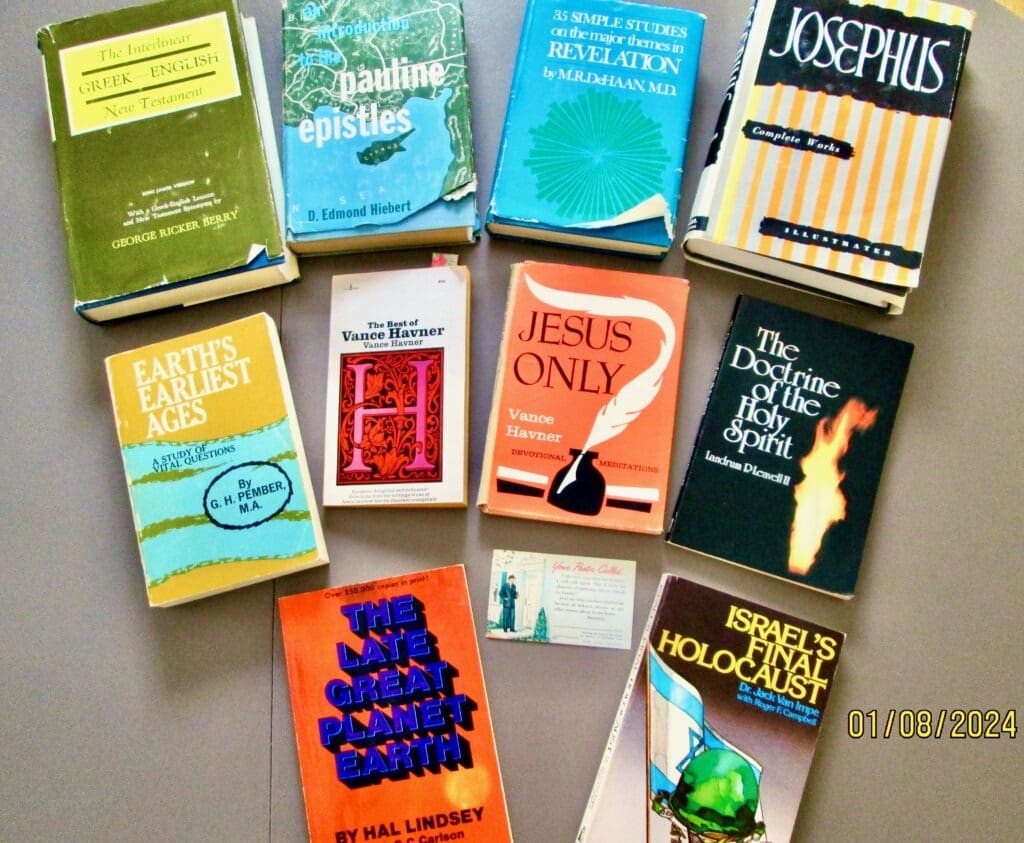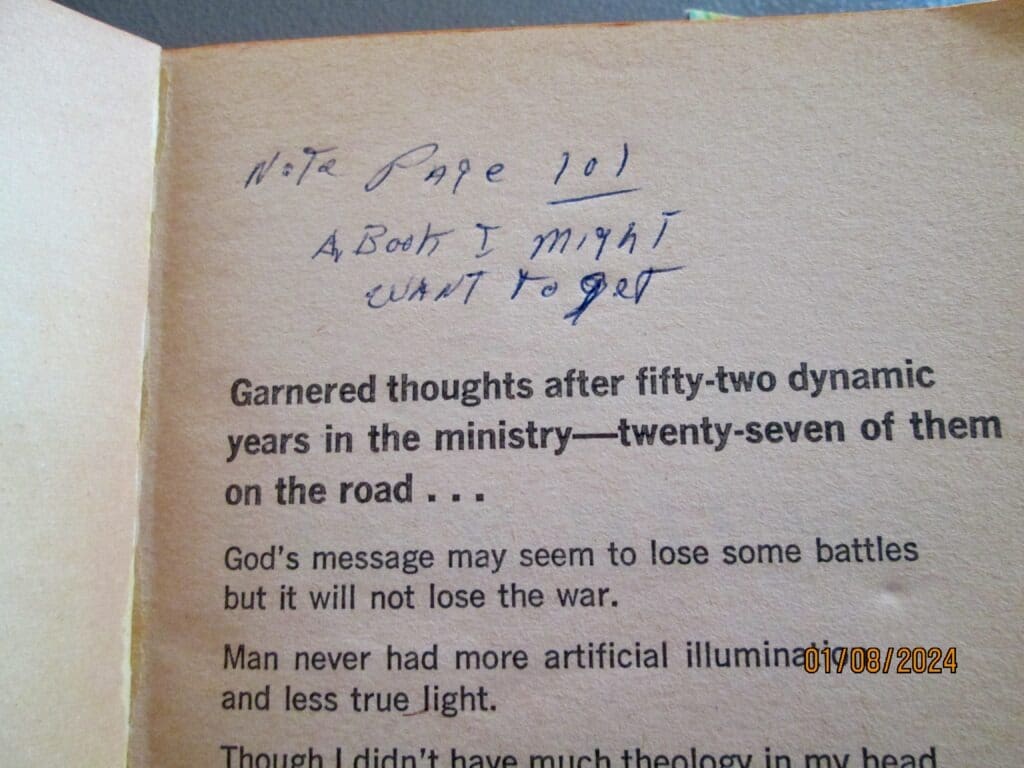My dad attended Fruitland Baptist Bible College when I was a child. He pastored four churches, and worked as an associate pastor for a short while. He will be ninety-years-old in April. He doesn’t read his seminary books anymore so I asked him what he planned to do with them. He said I could have them, and I was like “YES!” (SCORE!)
I checked with my brothers and they were not interested, so I have brought home treasure. Below are some of the ones I have already, but on my next visit, I will check for more.

In the lower middle of the books, I included a pastor’s calling card that my dad was using as a bookmark. Did you ever have a pastor call and leave one of those cards a long time ago? If so, would you share that experience in the comments below?
So far, I have read Israel’s final Holocaust, and 35 Simple Studies on the major themes in Revelation. I have just begun to read The Best of Vance Havner, by Vance Havner, first copyright date is 1937. I remember my dad talking about Vance Havner— a lot— but until now, never knew why he was so revered.
He was an amazing man!
In the preface of his book Vance Havner says, “Here is a cross-section of my messages from the days of a country pastorate to the stepped-up pace of the late 60’s…. Paperbacks often go where other books are not found and it is hoped that these reflections clad in plainer garb may be a blessing where costlier tomes might not be read.” (p.7)
The first chapter is entitled “Journey From Jugtown” and that is where we get to know Vance Havner. He says, “I grew up in the North Carolina hills…. My home community was called Jugtown because in the early years there were little shops up and down the road where potters wrought vessels of clay. I lived the simple, happy life of an old-fashioned country boy. I tramped the woods with a shepherd dog. There were plenty of outdoors, and all the plain joys of rustic youth uncushioned by modern conveniences. It would drive a teen-ager frantic these days but I thrived on it.” (p.9)
He continues telling about his childhood. His father was “austere” and a “devout” Christian who was the pastor’s right-hand man at Corinth Baptist Church. The preachers that came to preach at their church stayed in their house on Saturday nights before the fourth Sunday of each month. They came by horse and buggy.
Vance Havner says, “I grew up with a Bible in one hand and a bird book in the other….When I was ten, I professed faith in Christ. A revival was in progress at Corinth Church, but I came to Jesus alone in the woods. Always following an unbeaten path, I did not go to the mourner’s bench as the custom was but made my decision in a solitary place. There was no dramatic experience such as some can relate; I came as a child in simple trust. I did not understand all about the plan of salvation. I do not understand all about electricity, but I don’t intend to sit in the dark until I do. I was baptized in the South Fork River and a year later I asked the church to license me to preach. I began with a talk at the First Baptist Church of Hickory, twelve miles from my home.” (p. 10)
He preached for several years as a “boy preacher” then attended a baptist boarding school— South Fork Institute. He says he was definitely not a star student and often sat listening to a bird singing outside instead of listening to the professor. He attended what is now Gardner-Webb College (University) during the First World War. The principal of Gardner-Webb advised him to blaze his own trail instead of following the normal course of ministerial training.
Afterward he went to Catawba College for a year, then Wake Forest. He was so restless to begin preaching, one day he just up and packed his bags and left the school. A professor saw him at the railroad station and told him he would regret his decision to leave. He wrote, “I haven’t regretted it yet.” (p.11)
He started preaching again but became “enamored” with the liberal approach. He said, “It did not become malignant in my case, but I did have enough of the virus in my system to preach popular sermons that convicted nobody. The unbelievers liked my preaching and I had a good crowd, but many of them died unsaved under my ministry.” (p.11)
From 1934 to 1939 he was pastor of the First Church of Charleston, S.C. Here he experienced a deeper filling of the Holy Spirit after he read the book, Deeper Experiences of Famous Christians (More on this later.) He wrote his first book, By the Still Waters, and wrote for the Charlotte Observer and other religious publications. So many requests came for him to preach, he went on the road in 1940. After two years he was in a very low state physically and developed flu that put him in the hospital. He had been scheduled to be at a Bible Conference in Grand Rapids, but instead of staying up North, God was calling him to go south. His doctor even told him to go south to recuperate. He wired the Florida Bible Institute and accepted an invitation he had declined earlier. He not only met his wife, but he met Billy Graham there. (see pp. 12-13)
In 1960 after major surgery he developed a blood clot and came close to dying. He recounts how a Christian nurse, at her own request, sat at his bedside through the night praying and watching over him. Billy Graham had become a good friend and called Preacher Havner’s wife to say, “We had prayer for Vance and I told my wife that I believed the Lord would let Vance live awhile longer to prepare sermons for the rest of us to preach!” (p. 14)
At the time he included this story for the book (It looks like he included more stories at intervals with a final copyright in 1969.)— he had been twenty-seven years on the road, with fifty-two years in the ministry, and had written twenty books.
Deeper Experiences of Famous Christians
On the very first page of the book, I noticed my dad had written a note to himself.

We’ve all written notes of this sort in college when a professor or friend tells us of a book. Of course I had to go to page 101 to see what was recommended. I later found (as you can see from pages 12-13 account above) out that this was not the only time Vance Havner made mention of this book. The book Deeper Experiences of Famous Christians apparently made a deep impact on Vance Havner and gave him a deeper understanding of the filling of the Holy Spirit in his life. (I think after that book, he understood how electricity worked. 😃)
I have not seen it on my dad’s bookshelves so far, so I ordered it. Even though all these books are older, Amazon still has them.
Here is how the book is mentioned on page 101:
- “D.L. Moody was in the midst of a most successful ministry when two old ladies kept praying that he might have a renewed commission—and he did! A book that helped me greatly at a turning-point in my life, Deeper Experiences of Famous Christians, is a long record of re-signed credentials, men of God who came to a fresh dip in Jordan; and the amazing thing is that most of them were doing well, by ordinary standards, before their renewal. The average preacher today would be glad to settle for what most of them had before they moved out of their good into God’s best.” (p.101)
Why should Vance Havner be important to us?
Because he finished well!
On page 14, Vance Havner reminds us of the story of “Abraham’s servant, When he found the wife for Isaac (and) was invited to linger ten days, but he said, ‘Hinder me not, seeing the Lord hath prospered my way…’ (Genesis 24:56).” Preacher Havner continues… “I am resolved to make that reply when any subtle suggestion arises to take it easy and relax on my heavenly errand. When God has prospered a man’s way, he had better be on his way!…. I have no thought of retiring. I would say with Caleb, ‘…give me this mountain…’! (Joshua 14:12). I am not asking for molehills. Old soldiers need not fade away. I have asked like Hezekiah for an extension of time; like Jabez, for an enlargement of coast; like Elisha, for an endurement of power. Caleb did not suffer, like the ten frightened spies, from a grasshopper complex. Too many cowards are cringing before the giants of Anak. God give us Calebs looking for mountains to conquer!” (p. 14-15)
Vance Havner shares what he had to help him finish well. The Bible was foremost in teaching him what he needed to learn to finish well as he studied, quoted, and applied it to life. Studying the lives of others that went deeper with God and finished well was also helpful to him.
Vance Havner, through his books, is still teaching us from the grave about how to have a deeper walk with God. I pray that all who write for the LORD, will leave such a great legacy behind and be Calebs— and take our mountains.
If you have heard stories, mentions, or quotes related to Vance Havner—or Vance Havner has impacted your life in some way, please comment below and share what you have learned:)

Thank you for the information and insight, Jane. I’m happy that you are enjoying the books. Writers leave a legacy, and I’m grateful God provides readers for our words.
Yes, it is amazing that we can leave a legacy that someone might read. Thanks for commenting, Joni:)
As a youth, I met Vance Havner in his last years, and he autographed his book, “Though I Walk Through the Valley,” which I still have. A good book for those who may be suffering or grieving.
That is so exciting, Tim. Thanks for sharing that book with us. I’ll have to check it out.
Jane, what a treasure to have! My great-grandfather was a circuit preacher in rural Indiana. I can remember my Grandmother telling me stories about his travels. Close to the end of his pastorate, he and other men founded a Christian camp. I attended that camp when I was 13 and was baptized.
“Instead of standing in the premises we should be walking in the promises”
Thanks for reading and commenting, Beverly:)